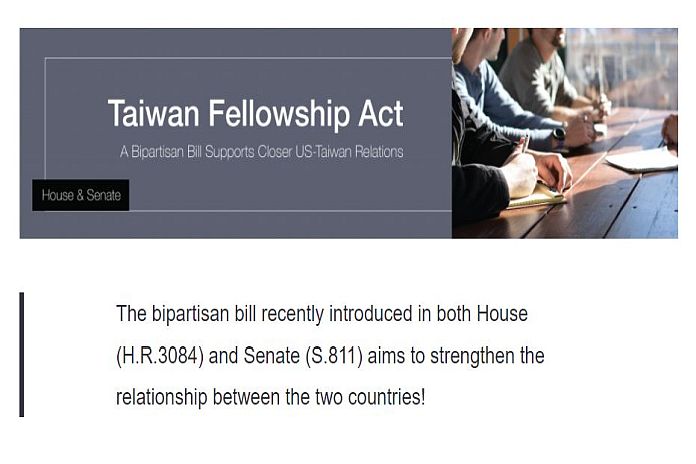By Caribbean News Global ![]()
TORONTO, Canada – Aimed at bolstering Taiwan-US exchange program – United States Innovation and Competition Act passed in the Senate with a 68-32 vote, on June 8, 2021, and sent to the House of Representatives for consideration, “demonstrate bipartisan support among American lawmakers for stronger Taiwan-US ties”, said Ministry of Foreign Affairs (MOFA).
Inclusive under the Taiwan Fellowship Act is the provision for the US to authorize US$17.3 million over seven years to make available fellowships to eligible US citizens for up to two years in Taiwan.
Co-sponsoring the Taiwan Fellowship Act in the Senate are Senators Chris Coons (D-Del.) and Jeanne Shaheen (D-N.H.).
“Fellowship broadens US cooperation with Taiwan and expertise in the Indo-Pacific region by exchanging US public servants to Taiwan,” noted a press release from Senators Edward J. Markey (D-Mass.), Chairman of the East Asia Subcommittee on the Senate Foreign Relations Committee, and Marco Rubio (R-Fla.), member of the Senate Foreign Relations Committee, along with Congressmen Ami Bera (CA-07) and Steve Chabot (OH-01), the Chairman and Ranking Member of the House Foreign Affairs Committee Asia Subcommittee.
“The Taiwan Fellowship Act builds upon the US strategic partnership with Taiwan’s vibrant democracy in areas in which Taiwan has long-held expertise – such as trade, human rights, the rule of law, regional security, and in global health,” said chairman Markey. “Through intensive language, cultural, and political immersion at a Taiwanese ministry or civic institution, US public servants will create lasting professional relationships and expertise that will far outlast each fellow’s time in Taiwan. […]
“The United States and Taiwan share a close partnership that is rooted in our shared commitment to democracy and the rule of law,” said chairman Bera. “This exchange program will give US policymakers the opportunity to live and work in Taiwan, equipping them with better knowledge of the region’s history, culture, and political dynamics. Such experiences and people-to-people connections are crucial for developing tomorrow’s Taiwan experts in the federal government and informing US foreign policy toward the Indo-Pacific. I am proud to work with Senators Markey, Rubio, and Representative Chabot on this bipartisan legislation that invests in a robust, enduring US -Taiwan relationship.”
“As a longtime supporter of the United States-Taiwan bilateral relationship, I have always been a firm believer in the importance of face-to-face interaction between our respective governments,” said representative Chabot. “That is why, I introduced, and in 2018, the president signed, the bipartisan Taiwan Travel Act, which fosters high-level dialogue. Such dialogue helps our two countries to see eye-to-eye, solve our differences, and meet shared challenges. The same holds true at the working level, and there is no better way to build relationships than having our personnel working side-by-side with their counterparts in Taiwanese ministries. The Taiwan Fellowship Act will set up a strong framework to make such collaboration possible and thereby deepen our bilateral relationship.”
Specifically, the Taiwan Fellowship Act would:
- Select no fewer than five fellows (expanded to 10 after two years) from the Legislative, Judicial, and Executive Branches of the US government to serve out a fellowship of up to two years in Taiwan;
- Encourage development of vital skills and expertise, including Mandarin language ability, by calling upon the State Department and American Institute of Taiwan (AIT) to give preference to fellowship candidates able to serve one or more years in Taiwan;
- Include a service requirement for returned fellows in order to expand official US government understanding of Taiwan and issues related to the broader economic, geo-strategic, and political realities of the Indo-Pacific.
“With Taiwan’s growing importance as a beacon for democracy in the Western Pacific and with its critical importance as a strategic asset to the United States the Taiwan Fellowship Act will have a profound impact on US-Taiwan relations. The undoubted success of the Taiwan Fellowship Act will emulate the success the Mansfield Fellowship program has brought to the forefront in helping foster closer US-Japan relations over the past three decades” – Minze Chien, PhD, National president, Formosan Association for Public Affairs (FAPA).
Other specific provisions authored and advocated for by Merkley that are included in the United States Innovation and Competition Act includes:
- Supporting United States educational and exchange programs with Taiwan by encouraging the establishment of an independent US-Taiwan Cultural Exchange Foundation.
- Requiring a strategy to respond to sharp power operations targeting Taiwan.
- Providing for improved language regarding the treatment of the Taiwan government.
A copy of the legislation can be found here.
While the United States continues its strategic partnership with Taiwan’s vibrant democracy of 23 million people, it is envisaged that upon successful conclusion of programs under the Taiwan Fellowship Act, that ‘fellows will be equipped to advance US values and interests in the Indo-Pacific region, with special emphasis on strengthening our strategic partnership with Taiwan.’
“The Taiwan Fellowship Act is a long-overdue investment in supporting the professional development of Taiwan experts in the United States federal government,” said Congressmen Ted S. Yoho (FL-03), Ranking Member of the House Foreign Affairs Committee Asia.
US – Taiwan education initiative is aimed at expanding access to Chinese and English language instruction, while safeguarding academic and intellectual freedom, also welcome opportunities to become a Chinese language instructor or to study Chinese in Taiwan. And teachers from Taiwan teaching Mandarin in Florida.
Events about US – Taiwan Education Initiative is available here.
With new guidelines for US – Taiwan interaction, American Institute in Taiwan (AIT) deputy director Ray Greene shares why and how US – Taiwan ties are growing stronger in education, economics, 5G, and defense. He also shares how the US is helping in Taiwan’s Bilingual Nation 2030 plan and how Taiwan can help fill the gap as Confucius Institutes close down.





